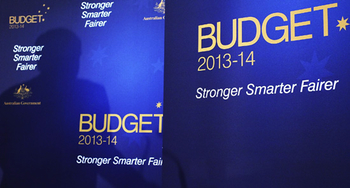[As it turns out, my planned Budget commentary for Crikey didn’t happen. I got up early in San Jose, read the budget papers and made notes, but then my as-yet-unwritten article got spiked. This is a quick and somewhat belated post based on my notes, not as polished as it might have been if written for Crikey.]
 The problem with Australia’s Labor government is that after having had One Big Idea for a bold new future in the National Broadband Network (NBN), they’ve come up with almost nothing anywhere else. This year’s federal budget was a dull plod. Again.
The problem with Australia’s Labor government is that after having had One Big Idea for a bold new future in the National Broadband Network (NBN), they’ve come up with almost nothing anywhere else. This year’s federal budget was a dull plod. Again.
There was even one move which struck me as remarkably dumb: capping the available tax deductions for self-education expenses at just $2000 a year. Apparently that saves $500 million, and that’ll go to the schools — and schools are good for the kiddies, of course — but that’s half a billion dollars less for people to be able to keep up with a rapidly-changing work environment.
This strikes me as particularly stupid when so many of the people servicing the computers, networks and other technology that powers small business are often freelancers, as are so many web developers and designers.
Two grand a year doesn’t go far when it costs nearly half that just to attend the annual user conference for just one of your core software toolsets — more if you have to add airfares and accommodation — and the rest would soon be burnt up on a handful of reference books.
Back when I used to work in various management and staff development roles, I was told that any organisation that wants to advance its knowledge base should be spending at least 5% of its time on staff development. In a technology field, in my opinion, that should be at least 10%. That’s four hours a week, or a week or so every three months.
That still doesn’t sound very much, but it’d cost at least four times that capped amount. And that’s still not compensating freelancers for the loss of billable hours.
“Business and training groups have already said capping the expenses will stop employers from being able to offer staff new training initiatives. There were reports [the week before the budget that] the government would end up reversing the move, but the budget papers now state the change is locked-in,” wrote Patrick Stafford at SmartCompany.
“The announcement is sure to raise the ire of small business groups. Many business owners also use these deductions for short courses and industry-based training sessions.”
There’s two particularly galling lines in the budget papers themselves. First, the tax deductions are now only available…
…where these expenses are incurred in the production of the taxpayer’s current assessable income.
So you’re discouraged from educating yourself for the jobs that will become available even in the very near future. Why?
The potential for uncapped claims for a wide range of expenses provides an opportunity for some people to enjoy significant private benefits at taxpayers’ expense.
Orly? That’s a bit rich, given that vast sums already given to private schools. Or the “baby bonus” that people on quite significant household incomes still get for extruding another brat. That simply reeks of hypocrisy.
Continue reading “Australia’s Budget 2013 keeps us stuck in the past”



![Labor's Plan for Cyber Safety (November 2007): click to download [61kB PDF]](https://stilgherrian.com/wp-content/uploads/2010/06/labors_plan_for_cyber_safety_75w.jpg)